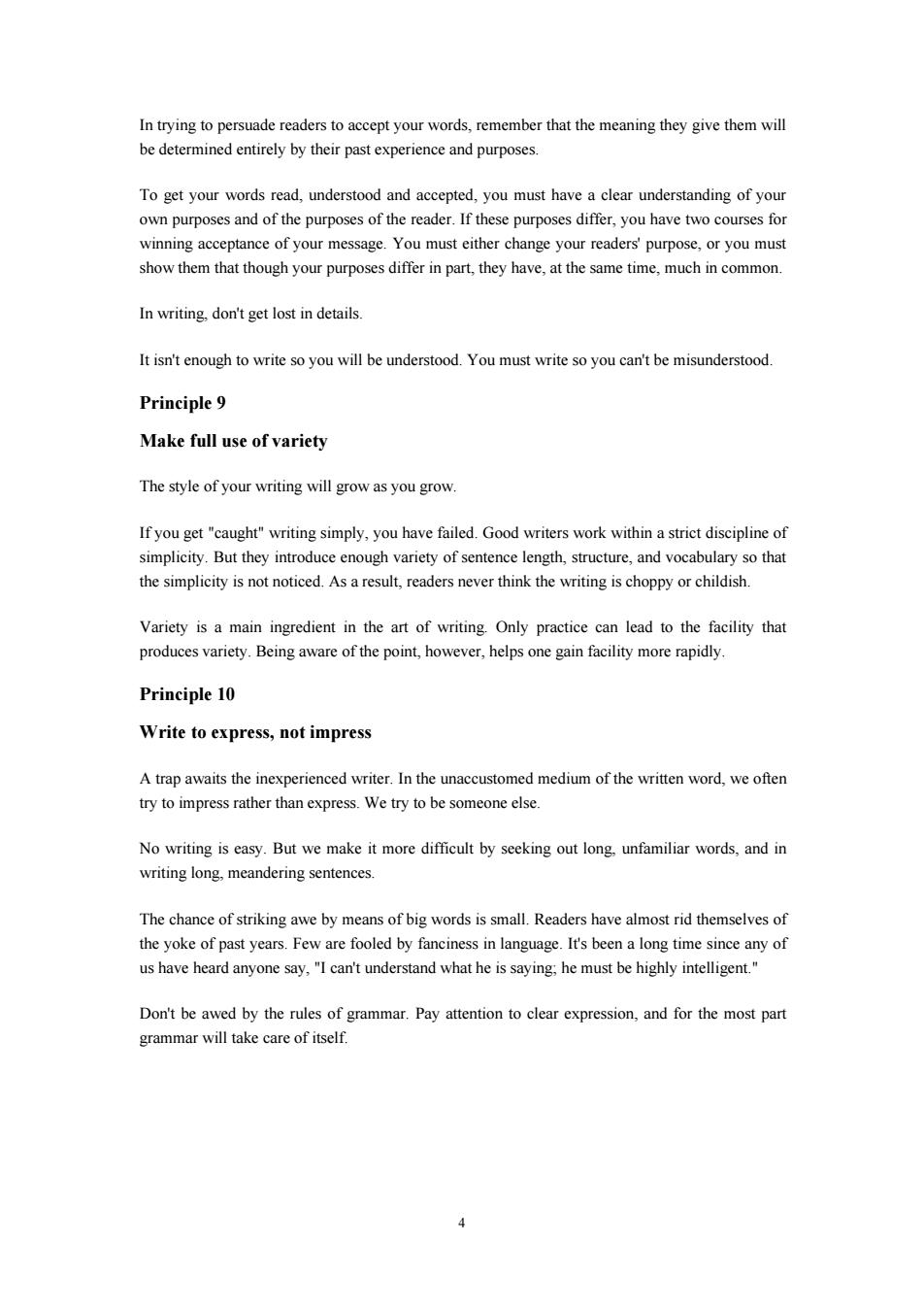正在加载图片...

In trying to persuade readers to accept your words,remember that the meaning they give them will be determined entirely by their past experience and purposes. To get your words read,understood and accepted,you must have a clear understanding of your own purposes and of the purposes of the reader.If these purposes differ,you have two courses for winning acceptance of your message.You must either change your readers'purpose,or you must show them that though your purposes differ in part,they have,at the same time,much in common. In writing,don't get lost in details. It isn't enough to write so you will be understood.You must write so you can't be misunderstood. Principle 9 Make full use of variety The style of your writing will grow as you grow. If you get"caught"writing simply,you have failed.Good writers work within a strict discipline of simplicity.But they introduce enough variety of sentence length,structure,and vocabulary so that the simplicity is not noticed.As a result,readers never think the writing is choppy or childish. Variety is a main ingredient in the art of writing.Only practice can lead to the facility that produces variety.Being aware of the point,however,helps one gain facility more rapidly. Principle 10 Write to express,not impress A trap awaits the inexperienced writer.In the unaccustomed medium of the written word,we often try to impress rather than express.We try to be someone else No writing is easy.But we make it more difficult by seeking out long,unfamiliar words,and in writing long,meandering sentences. The chance of striking awe by means of big words is small.Readers have almost rid themselves of the yoke of past years.Few are fooled by fanciness in language.It's been a long time since any of us have heard anyone say,"I can't understand what he is saying;he must be highly intelligent." Don't be awed by the rules of grammar.Pay attention to clear expression,and for the most part grammar will take care of itself.4 In trying to persuade readers to accept your words, remember that the meaning they give them will be determined entirely by their past experience and purposes. To get your words read, understood and accepted, you must have a clear understanding of your own purposes and of the purposes of the reader. If these purposes differ, you have two courses for winning acceptance of your message. You must either change your readers' purpose, or you must show them that though your purposes differ in part, they have, at the same time, much in common. In writing, don't get lost in details. It isn't enough to write so you will be understood. You must write so you can't be misunderstood. Principle 9 Make full use of variety The style of your writing will grow as you grow. If you get "caught" writing simply, you have failed. Good writers work within a strict discipline of simplicity. But they introduce enough variety of sentence length, structure, and vocabulary so that the simplicity is not noticed. As a result, readers never think the writing is choppy or childish. Variety is a main ingredient in the art of writing. Only practice can lead to the facility that produces variety. Being aware of the point, however, helps one gain facility more rapidly. Principle 10 Write to express, not impress A trap awaits the inexperienced writer. In the unaccustomed medium of the written word, we often try to impress rather than express. We try to be someone else. No writing is easy. But we make it more difficult by seeking out long, unfamiliar words, and in writing long, meandering sentences. The chance of striking awe by means of big words is small. Readers have almost rid themselves of the yoke of past years. Few are fooled by fanciness in language. It's been a long time since any of us have heard anyone say, "I can't understand what he is saying; he must be highly intelligent." Don't be awed by the rules of grammar. Pay attention to clear expression, and for the most part grammar will take care of itself